Can Dogs Eat Yu Choy? The short answer is yes, dogs can eat yu choy, it is rich in essential nutrients like vitamins A, and C. It also contains fiber content all these nutrients contribute to dogs’ overall well-being.
However, it’s crucial to prepare it by steaming or boiling it before feeding it to your dog to ensure easy digestion and avoid adding seasoning or additives that might be harmful to dogs.
In this article, we will explore the nutritional benefits, and potential health concerns of overfeeding and also suggest some best methods to feed this healthy vegetable to your pup. Let’s delve into the article.
What is Yu Choy?
Yu Choy, also known as Choy Sum or Chinese flowering cabbage, is a leafy green vegetable commonly used in Asian dishes. It belongs to the same family as broccoli and bok choy. This nutritious vegetable is packed with essential minerals like calcium, iron, magnesium, and potassium.
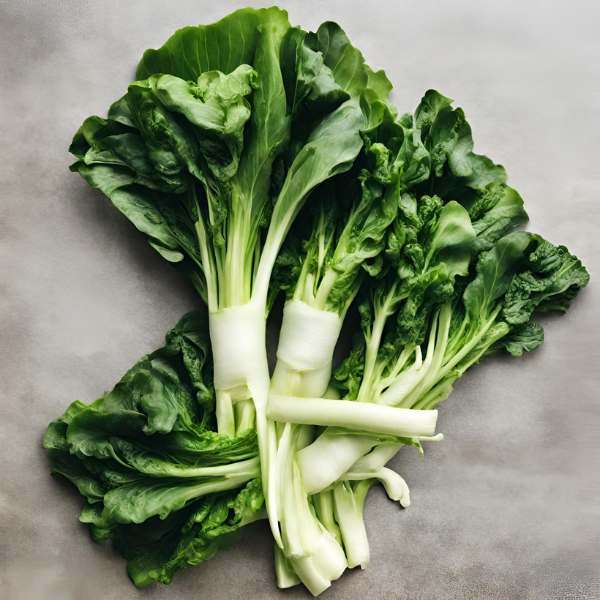
Yu Choy is a versatile vegetable that you can cook in various ways, including stir-frying, steaming, or blanching. When added to dishes, it brings a mildly bitter flavor and a tasty crunch, making it a popular pick for Asian stir-fries and soups.
Can Dogs Eat Yu Choy?
Yes, dogs can eat Yu Choy in moderation. It contains essential vitamins and minerals such as calcium, iron, and potassium, which can be good for your dog’s health.
However, it’s better to give it as an occasional treat and not make it a primary food source. Always make sure the Yu Choy is cooked and free from any seasonings or additives that may be harmful to dogs.
Slowly monitor any potential allergic reactions or digestive issues in your dog, while consulting with a veterinarian before adding Yu Choy to your dog’s diet is advisable.
Nutritional Composition of Yu Choy
Here is a table summarizing the nutritional composition of Yu Choy:
| Nutrient | Amount per 100g |
|---|---|
| Calories | 45 kcal |
| Protein | 3.3 g |
| Carbohydrates | 7.1 g |
| Fiber | 2.5 g |
| Sugars | 1.4 g |
| Fat | 0.7 g |
| Vitamin A | 3370 IU |
| Vitamin C | 67 mg |
| Vitamin K | 830 mcg |
| Folate | 97 mcg |
| Calcium | 384 mg |
| Iron | 2.5 mg |
| Magnesium | 45 mg |
| Potassium | 554 mg |
Please note that these values are approximate and can vary based on factors such as cooking methods and specific varieties of Yu Choy.
Health Benefits of Yu Choy for Dogs
Yu Choy offers several health benefits for dogs when included in your dog diet in moderation, some of them are given below:
Nutrient Density:
Yu Choy is a nutrient-rich vegetable, containing essential vitamins and minerals such as calcium, iron, magnesium, and potassium. These nutrients are responsible for contributing to overall canine health, supporting bone strength, muscle function, and more.
Vitamins:
Yu Choy is a rich source of vitamins, including vitamin A and vitamin K. Vitamin A is essential for vision and skin health in dogs, while vitamin K plays a crucial role in blood clotting and bone metabolism.
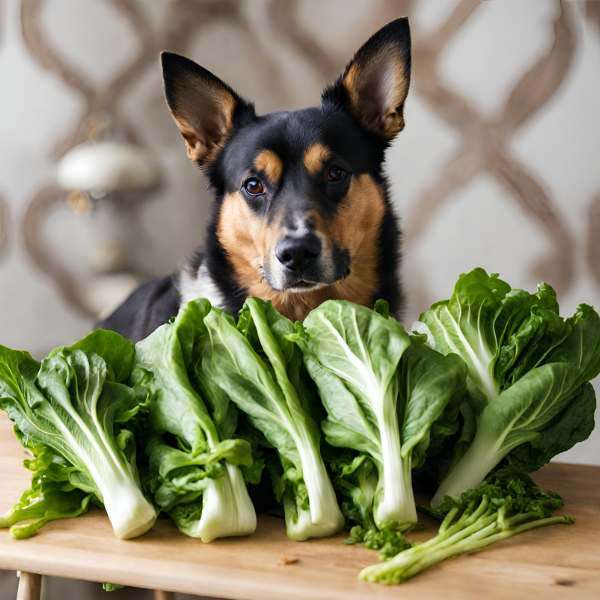
Antioxidants:
This vegetable contains antioxidants, including vitamin C, which can help boost your dog’s immune system. Antioxidants combat harmful free radicals, protecting your dog’s cells from damage.
Fiber:
Yu Choy is also high in dietary fiber, which helps in promoting healthy digestion and regular bowel movements in dogs. It can be beneficial for dogs with constipation or other digestive issues.
Hydration:
Due to its high water content, Yu Choy can help maintain your dog’s hydration. This is especially advantageous during hot weather for dogs who may not drink enough water.
Low-Calorie Option:
It’s low in calories, which is a great source of nutrients that help in weight management. It gives them important nutrients without overloading them with calories.
Potential Health Risks Associated with Yu Choy for Dogs
While Yu Choy offers so many benefits for your dog’s health, it’s also important to know about possible health risks associated with feeding too much Yu Choy:
Upset Tummy:
If your dog too much eats Yu Choy, your dog’s tummy might get upset. This can lead to health issues like diarrhea or vomiting.
Watch for Kidney Stones:
Yu Choy has compounds called oxalates, and for some dogs, these can create kidney stones. Especially if your dog has had kidney problems before.
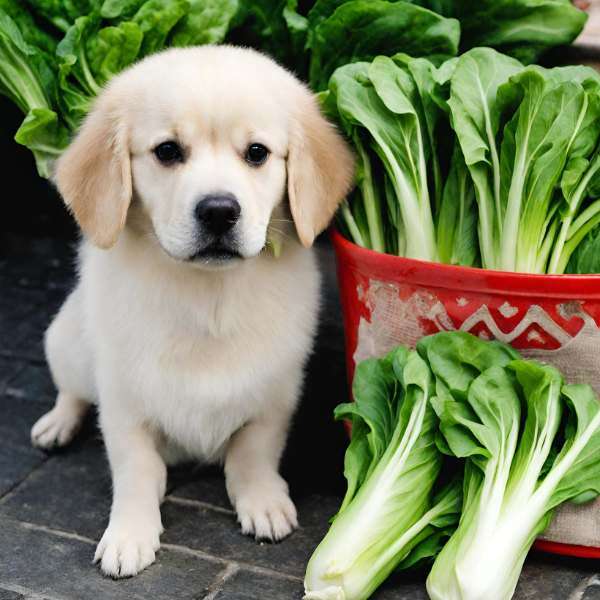
Allergic Alarm:
A few dogs might have allergies to vegetables like Yu Choy. Regularly observe the signs like itching, hives, or tummy troubles when you try new foods.
Unique Doggos:
Every dog has its unique whim, and some foods may be fine for one might not be for another. So, pay close attention to how your dog reacts when you introduce it.
How to Serve Yo Choy to Your Dog?
Adding Yu Choy to your dog’s diet can be a healthy move if you follow these steps:
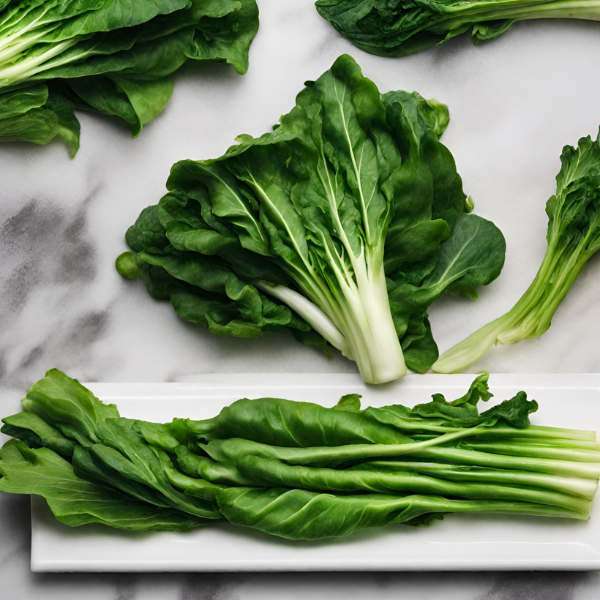
Thorough Cleaning: Start by giving a good wash to Yu Choy to remove any dirt, pesticides, or yucky stuff. Make sure it’s clean and safe before feeding it to your dog.
Cook It Up: It’s best to cook the Yu Choy before feeding it to your dog. Steaming or boiling works well and keeps most of the healthy nutrients in it. Don’t use fancy spices, seasonings, or oils as they can harm your dog.
Cut It Small: Also, cut the Yu Choy into small dog-friendly pieces. This makes it easier for your furry friend to eat and digest.
Keep It Plain: Don’t get fancy with sauces, spices, or seasonings. Your dog should have it plain, without any extra stuff.
Watch Portions: Pay attention to how your dog behaves after eating it. While Yu Choy is generally safe, but too much can upset your dog’s tummy.
Mix with Regular Food: You can mix cooked Yu Choy with your dog’s regular food. This helps them get used to it slowly and keeps their diet balanced.
How Much Yo Choy is Safe for Your Dog?
The right amount of Yu Choy, or any veggies, for your dog, depends on their size, age, and what they need to eat. Here’s are some guidance for you:
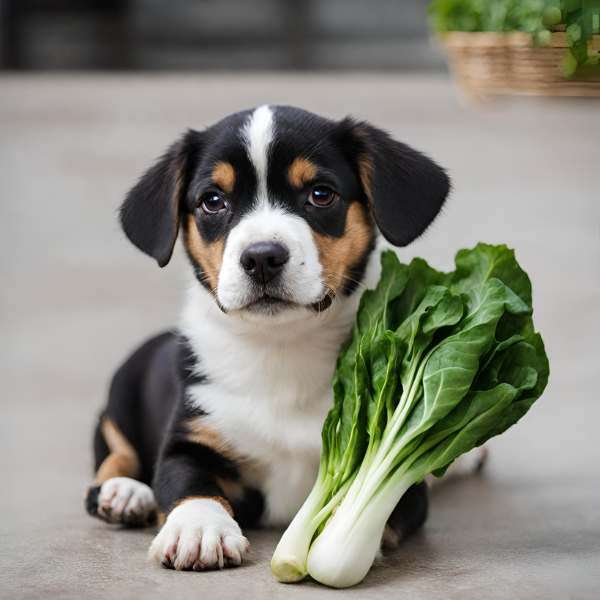
Small Pups: If you have a small dog, begin by offering them a small portion, such as a teaspoon to a tablespoon of cooked and chopped Yu Choy, mixed with their regular food. Monitor their response closely and adjust the amount as necessary.
Middle-of-the-Road Doggos: Medium-sized dogs can handle a bit more, usually around one to two tablespoons. But still, keep an eye on them and make changes if necessary.
Big Woofers: If you have a big dog, they can have a bit more, maybe a few tablespoons of Yu Choy. But, always be on the lookout for any problems.
FAQS
What are the health benefits of feeding bok choy to dogs?
Bok choy is rich in vitamins and antioxidants, including vitamin A, vitamin K, and folate. It can support your dog’s vision, heart health, bone health, and immune system.
How should I prepare bok choy for my dog?
You can feed your dog steamed or cooked bok choy without any seasonings or additives. Avoid using onions or garlic, as they are toxic to dogs.
How much bok choy can I safely give my dog?
The amount of bok choy depends on your dog’s size, weight, and individual dietary needs. Start with a small portion and monitor their reaction. Consult your vet for specific guidance.
Can puppies eat bok choy?
While bok choy is safe for adult dogs, it’s best to consult your veterinarian before introducing it to puppies. Puppies have different nutritional requirements.
Conclusion
In conclusion, Y choy is safe for dogs and has many benefits for your pup health. If you want your dog to enjoy them, you need to follow the proper guidelines. Feel free to explore our additional blog posts to enhance your understanding of different foods across different categories.
Happy Snacking!
